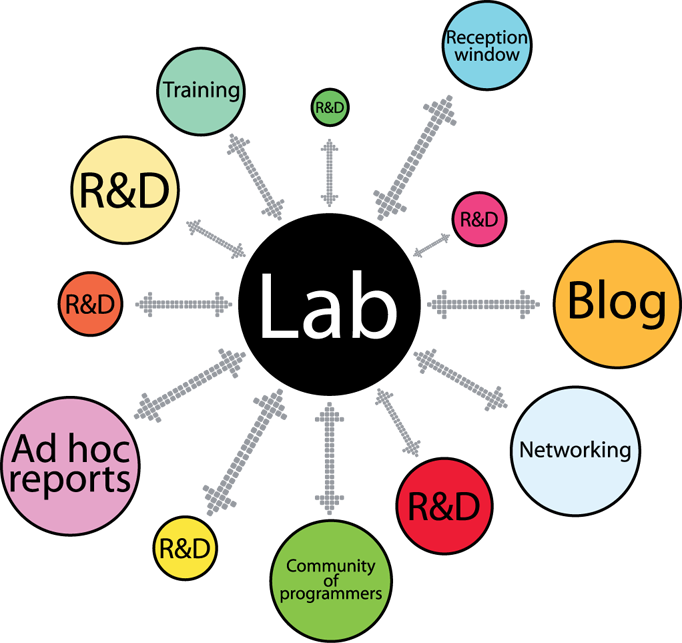If the countries of the South face difficulties when it comes to producing infrastructures and knowledge that are in tune with local possibilities, what is missing to a large extent is the research and development (R&D) variable. States and companies from the North have been investing in this area for decades, which explains their enormous industrial superiority.[1] China is perhaps the developing country that has been quickest to understand this aspect and allocates significant amounts to producing technologies designed for its own projects. It is true that other countries of the South do not always possess the necessary funds to imitate the Chinese strategy, but there are alternative ways to bolster this factor using resources already available. In fact, in all the regions studied there are laboratories and experimentation centres – both public and private – that can play a key role in the restructuring of the publishing industry. Our proposals on this aspect are the following:
First of all, given the standing of bodies like ictQatar or Qatar Foundation – among so many others that so far do not appear to have had close dealings with publishers –, it would be useful to exhaustively map those centres throughout the 6 regions studied.
Since there are also R&D units and other institutions in developed countries that may be open to collaborating on the initiative, it will be necessary to include in the mapping work the localization of possible allies from the North.
Thirdly, it would not be in vain to launch an appeal for programmers to offer their services free of charge in order to help implement technological solutions. Examples of communities that generate open source solutions for WordPress or Joomla are a valuable precedent.
Our final, and perhaps most important, suggestion in this study is that the International Alliance of Independent Publishers also set up its own compact and dynamic laboratory that can collaborate with as many publishers as possible from the South, through the following activities:
- keeping a blog with up-to-date information on new technologies, in particular with news from developing regions. The articles should be in French, English and Spanish at the very least;
- setting aside a space within the same website to serve as a reception window for technical problems raised by publishers;
- carrying out the mapping work detailed above;
- supervising the networking between R&D centres from the North and South, as well as maintaining the community of ad honorem programmers, in order to resolve the technical challenges presented by the publishers. The solutions implemented – scripts, plugins, etc – can be distributed with a free and open source software license.
- organizing the different training and networking initiatives described above;
- periodically broadening the research on digital publishing to include actors, perspectives and other elements that can also be incorporated into the blog – for example, up-to-date statistics, interviews with publishers that have carried out trials with digital technologies, etc.
- for those actions it is unable to implement itself, the laboratory will have the possibility of compiling ad hoc reports that will be sent to governments, companies and NGOs in order to bring about positive and effective change. These initiatives – some of which have already been mentioned – simultaneously involve technical, legal, economic and political dimensions and can be extended as the work of the laboratory progresses. We are referring in particular to the following needs:
- to promote the installation of POD terminals;
- to accelerate the digitization of backlists;
- to encourage the standardization of metadata;
- to increase the means of payment and collection;
- to set a differential VAT rate for electronic books;
- to obtain reduced rates for publishers from the South who use proprietary software;
- to procure fair commercial conditions for digital distribution;
- to help professionals that can’t obtain ISBN for censorship reasons to find another type of register for distributing their digital works.
To meet this ambitious programme – whose complexity lies not only in technical matters but also in intense networking and lobbying efforts –, the laboratory will have to include at least one digital publisher from the North and another from the South, as well as a programmer and web designer. Given the costs arising from the structure and activities here described, it will be essential to seek out allied institutions that can contribute financially to a medium and long-term action plan.

- Cf. http://unesdoc.unesco.org/images/0018/001899/189958E.pdf, p. 4 onwards.↵